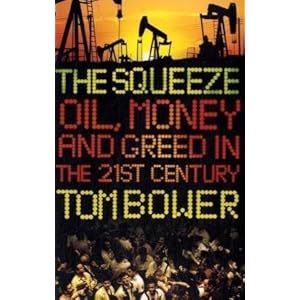Over the summer, I really savoured reading Tom Bower’s book, OIL – Money, Politics, and Power in the 21st Century which – covering 1990-2009 – has become the unofficial sequel to Daniel Yergin’s The Prize: The Epic Quest for Oil, Money, and Power – covering the 1850s to 1990.

So if you’ll forgive the pun, I’d like to crudely summarize some of the best points from Bower’s book thus;
- There’s actually plenty of oil – it’s just in the wrong place, too many restrictions on its extraction, limited finance and bottlenecks in refineries
- The immensely diverse oil industry – downstream, upstream, traders, engineers, accountants, politicians, economists, refinery workers etc. all work in silos and don’t interact, less still understand each other
- So no one apart from the occasional brilliant or lucky trader has any lasting insight on the price of oil which has a massive impact on the investment horizon
- As for the IOCs (Independent Oil Companies)
- BP under Lord Browne was very go-ahead trying to boost reserves and sloppy on safety and outsourcing engineering (this before Deepwater Horizon)
- Shell prospered but was often beset by Anglo-Dutch internal squabbles and having rings run round it by Oligarchs, Greenpeace etc.
- Exxon is a stultifyingly dull bureaucracy, obssessed with safety, has absolute faith in itself and is usually right
- As for the NOCs (National Oil Companies)
- They may have the oil, but they don’t have the technology or the finances and tend to overstate their reserves
- And they constantly strive to renegotiate settled deals with scant regard to reputation or the balance sheets of their partners
- Oil producers are ultimately far more dependent on consumers than the opposite
- It’s all about achieving an elusive balance between governments, regulators, markets and nature
For all that, compared to preceeding years, oil prices have now gone through a year of relatively high stability, largely in the $65-$80 range which makes me think it won’t last.
So I keep wondering about this piece in the Wall Street Journal a few days ago, The Trade and Tax Doomsday Clocks. Whilst being critical of the Currency Reform for Fair Trade Act which would mandate the US Department of Commerce to take a foreign country’s currency interventions into account in determining whether its trading practices are unfair (crazy in my view – see my earlier post) it makes a fascinating point about the impact such a policy would have on the price of oil;
“…an unintended consequence is that it will make China an even more voracious competitor for oil. That’s because oil is priced in dollars, so a revaluation would make it cheaper in yuan terms. Remember, during the period from 2005 to 2008 when the yuan was revalued under similar political pressures from the U.S., the price of oil rose, not coincidentally, to $147 per barrel from $60. That could happen again—and it would be another inflationary tax on U.S. consumers.”
I looked at this chart (CNY:USD 5 years) and this seems to be true. The roughly 16% gain in the Yuan over the last 5 years against the dollar is quite well correlated to the jump in oil prices that we had over that period. So maybe we now have a clearer idea with recent history in mind of what can cause oil prices to go up again?
The bottom line is that the USA has had all the benefits of having the global currency – cheap credit, low transaction costs and enormous diplomatic leverage for too long to now turn round and demand China revalues their own which will cost the Chinese and the USA dearly if not managed gradually. And should such a dispute kick off, all sorts of unintended consequences like higher oil prices will hurt the rest of us. I really hope America’s politicians pull back from the brink on this one. Because as I wrote back in Spring 2007 for World Finance magazine, The nightmare of a Chinese economic collapse, the consequences could be very ugly.



